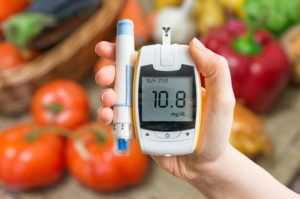With the alarming rise in diabetes diagnoses in recent years, it should come as no surprise that the medical community is doing all they can to thwart the increase. This includes empowering patients, both adults and children at risk of developing diabetes, through education.
There are 2 main types of diabetes: type 1 and type 2. Understanding the difference between these can help you understand your risk and prevention.
Type 1 diabetes, also called juvenile diabetes because it typically shows up in childhood, is a result of your body not producing enough insulin. While the cause is still not completely understood, genetics certainly play a critical role in its development. Type 1 diabetes accounts for 5% of diabetes in the adult population.
On the other hand, type 2 diabetes happens when your body produces enough insulin but you are resistant to it. It seems to be caused predominantly by lifestyle factors and makes up nearly 95% of adult diabetes. While genetics still may play some role, there are ways you can lower your risk for developing it.
Healthy lifestyle habits are a key component to lowering your risk. While there currently is no magic vaccine that prevents type 2 diabetes, there are simple lifestyle and diet changes that can greatly reduce your risk. These same changes also benefit other areas of your health, like your heart and lungs.
You are seven times more likely to develop type 2 diabetes if you are overweight. Moreover, if you are obese it makes you 20 – 40 times more likely to develop diabetes. Keep your weight within a healthy range to help lower your risk of developing diabetes.
Be active! Not only does exercise help you lose excess weight, but working your muscles also helps to improve their ability to use insulin and absorb glucose. This in turn can lower the stress on your insulin-making cells.
Watch what you eat. Spikes in blood sugar and insulin take a toll on insulin-making cells. This makes you more susceptible to developing diabetes. Choosing foods like whole grains that slowly and gradually increase your blood sugar and insulin, over starchy and sugary foods and drinks, can significantly lower your risk.
It goes without saying that quitting smoking can drastically increase your overall health, but did you know it could greatly reduce your risk of type 2 diabetes? Smokers are statistically much more likely to develop diabetes (and many other unnecessary diseases and disorders) than non-smokers. So please, quit smoking as soon as possible.
If you are concerned about your risk or want to be evaluated for your risk for diabetes, board-certified internal medicine specialist Dr. Ishan Gunawardene and Nurse Practitioner Shariffa Gunawardene at Wellington Advanced Medical are here to help. Through a comprehensive exam, our compassionate providers fully assess your risk, and then offer lifestyle and dietary change support. To make an appointment with one of our diabetes experts in Wellington or Royal Palm Beach, request an appointment online or call (561) 434-1935 today.


